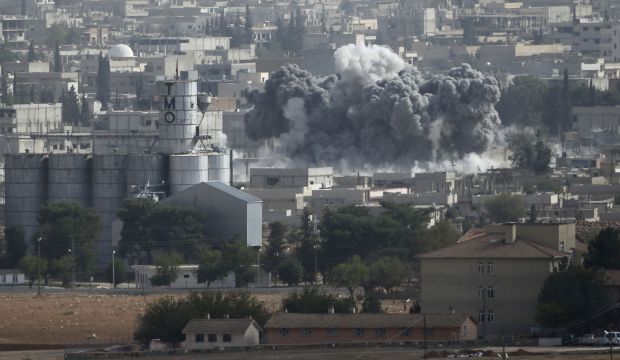
Smoke rises from the Syrian town of Kobani, seen from near the Mürşitpınar border crossing on the Turkish–Syrian border, on October 13, 2014. (Reuters/Umit Bektas)
Beirut and London, Asharq Al-Awsat—Fighters from the Kurdish volunteer militia, the People’s Protection Units (YPG), held back the advance of the Islamic State of Iraq and Syria (ISIS) on the strategically important border city of Kobani on Sunday, as coalition forces target ISIS positions in and around the city.
The Syrian Observatory for Human Rights said on coalition forces launched five airstrikes on Monday morning targeting ISIS positions south of the city, while YPG forces continued to hold back the extremist group’s assault
This follows fierce fighting between ISIS and YPG, as well as another barrage of coalition airstrikes, on Saturday evening and Sunday morning, with YPG forces causing “considerable losses” to the extremist group, according to Syrian Observatory head Rami Abdulrahman, thanks to nine airstrikes which targeted ISIS positions east of the city and in the surrounding countryside.
Idris Naasan, a spokesman for Kurdish fighters in Kobani, told Asharq Al-Awsat the latest coalition airstrikes had succeeded in helping hold back ISIS fighters from reaching the Kurdish stronghold.
But he added that Kobani remained “in danger” so long as the international anti-ISIS coalition did not supply YPG forces with additional weaponry.
“The strikes are hurting ISIS, but they will not be able to remove the group [from Kobani] without equally strong resistance on the ground, which is the only way to defeat the group in [the battle for] Kobani,” Naasan said.
Abdulrahman also said the group were expecting reinforcements, most coming from Syria, especially the ISIS stronghold Raqqa, adding that the group was clearly suffering from a shortage of fighters given that they were now “resorting even to sending [to Kobani] members of the religious police” force which the group uses to enforce its own brand of Shari’a in captured territory, as well as members of the group “not well-versed in fighting.”
ISIS has been laying siege to the strategically important city near the Turkish border for more than three weeks now. Some 550 people, including roughly 20 civilians, have been killed since the fighting began for control of the city, according to the Syrian Observatory, with an estimated 300,000 fleeing the city and surrounding villages, most of them heading to refugee camps in Turkey.
Abdulrahman said the battle for Kobani was for ISIS as a “critical” one, adding that losing the city would likely “damage its credibility in the eyes of jihadists” and potential recruits around the world.
But Abdulrahman said the group had not “progressed much” since Friday in its bid to take the city, having been held back by a combination of YPG fighters and aerial bombardment from coalition forces these last few days.
Also on Sunday, US National Security Adviser Susan Rice said that the Turkish government had given the US permission to launch airstrikes in Syria and Iraq from bases on its territory, as well as using them to train “moderate” Syrian rebels.
Turkey has so far been reluctant to intervene in the fighting in northern Syria between ISIS and the area’s Kurds, angering its own Kurdish population.
However, Ankara also continues to push the US to take action against Syria’s President Bashar Al-Assad as well as ISIS, and create a buffer zone free of Syrian government forces along the Turkish-Syria border as well as a no-fly zone in the same area.
The proposals have not received a warm welcome in Washington. General Martin Dempsey, the most senior US military officer and President Obama’s chief military adviser, said on Sunday that Turkey’s proposals were not “actively being considered.”
